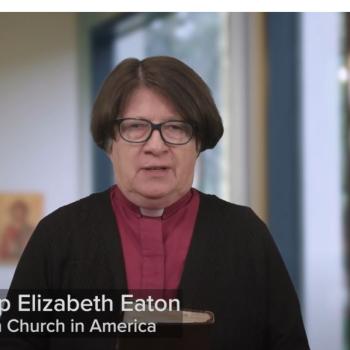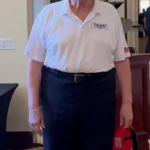From my perspective as a church insider, Aziraphale’s choice reflects the tragic theology and ecclesiology of Good Omens.
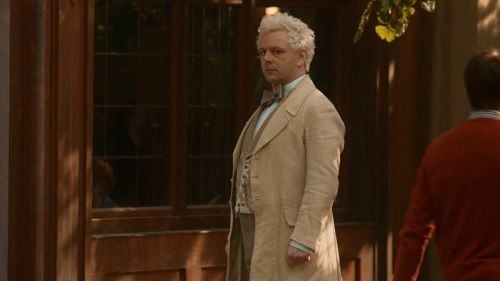
Spoiler alert:
HIGH! Don’t read this until you’ve watched all of Good Omens 2 through the end of episode 6.
This is part three in a trilogy of articles on the BBC Studios/Amazon Studios series Good Omens. Part One: Good Omens: An Antidote to Toxic Christian Apocalyptic Fiction. Part Two: Falling in Love with Aziraphale and Crowley: Love Leaves Its Clues.
It’s episode 6 of Good Omens 2, and Aziraphale (Michael Sheen) and Crowley (David Tennant) have once again averted Armageddon! Right there in the bookshop!
As they watch Gabriel and the Beelzebub join hands and sing their “Every Day” song in a moment of sweet reunion, Aziraphale suddenly grasps Crowley’s arm. It’s as if he’s trying to steady himself. Because, indeed, the foundations of the universe have shifted beneath them. Now that another angel and demon have broken down the barriers and bridged the cosmic divide, perhaps they can, too!
Crowley certainly is convinced that a paradigm shift has happened.
As Aziraphale and the Metatron go for a stroll over coffee, the demon tidies up the bookshop. His theme song plays tenderly in the background as Crowley sets everything to rights after the dust-up from the celestial skirmish. Convinced by Nina and Maggie to reveal his true feelings to Aziraphale, he’s ready to finally tell him what he’s wanted to say for 6,000 years.
“Hold that thought!”
But when Aziraphale comes back, he interrupts Crowley with the “incredibly good news” that he’s practically bursting to tell him.
The Metatron has offered Aziraphale the position of Supreme Archangel and Commander of the Heavenly Host!
And, even better, he has allowed Aziraphale to restore Crowley to “full angelic status!”
“You could come back to Heaven and . . . and everything, like the old times!” Aziraphale says, barely containing his excitement.
“And you told him just where he could stick it, then?”
Crowley tries to convince Aziraphale that they are, in fact, better than Heaven. That Aziraphale himself is better than Heaven. And that he should refuse to “join their team,” just as Crowley has rejected Hell’s team.
But Aziraphale insists that Heaven is “the side of truth, of light, of good.”
Really, Aziraphale? After everything you’ve seen them do to Crowley? To you? And what they plan to do to the Earth – which is to end it all?
“Tell me you said no.”
His voice breaking with desperation, Crowley pleads, “Tell me you said no.”
And then Aziraphale said the words that set off all the alarms for me, a church-insider: “If I’m in charge . . . I can make a difference.”
Oh, Aziraphale, no. Please, no! You should know better by now!
I watched this scene between Aziraphale and Crowley unfold with gut-wrenching dismay.
Because I myself am a servant of “the good guys.”
I’m an ordained minister in a mainline Protestant church and a seminary professor. I’m a church insider. And I see much of myself in Aziraphale’s character.
I’ve been an ordained minister in the Evangelical Lutheran Church in America for nearly 25 years. I was brought up in the Lutheran church and, like Aziraphale, have had the same kind of idealism about those who presumably work for God. But decades of theological education, along with seeing the underside of my institution, have changed me and how I look at things.
My reading of Terry Pratchett and Neil Gaiman’s original book, Good Omens, and my viewing of the television series are shaped by my training to discern the underlying theology that stories communicate. With Good Omens, I see a very interesting theological mash-up that is at once amusing and confounding while offering a biting (and valid) ecclesiological critique.
Aziraphale as parish pastor
In many ways Aziraphale functions as a local parish pastor. He wears antiquated clothes from the 1800s, just as clergy wear clerical collars and shirts developed during that same period. He walks through the neighborhood offering kindly words, forgiving debts, and noticing the little details about people’s lives that allows him to make connections with them.
Also, aspects of Aziraphale’s bookshop resemble a church. There is sacred space at the center where he prays, where candles are lit, and where he has a direct line to the heavenly powers. His collection of books reminds me of a pastor’s office lined with sacred texts that hold the wisdom of the ages.
And when the demons threaten his “congregation” of the shopkeepers, Aziraphale stands between them and the hellish fiends like a good shepherd defending his flock.
I love everything about Aziraphale.
(And I love everything about Michael Sheen, the actor who plays him.)
This is probably because he reminds me so much of what I have striven for in my life and career: an unwavering dedication to goodness, forgiveness, protecting the vulnerable, and even working with trusted colleagues to try and save the world. (I have spent the last two decades of my life in the religious climate and environmental movement trying to forestall the results of the ecological sins our species hath wrought.)
Watching Good Omens as a church insider

But I also recognize in Aziraphale a level of gullibility and privileged naivete that prevents him from seeing, much less admitting, the truth about his institution. It’s the same kind of naivete and ill-informed trust that for most of my career kept me from recognizing the harm that my institution, the denominational church, has done to so many people. Especially to people of color.
My failure to see this harm is due in large part to my race and culture.
I am a white, English-speaking, U.S.-born ordained minister who has been, until very recently, blissfully shielded from seeing the damage that the church does to its clergy and congregations of color.
But for the past two and a half years, I have walked with a Puerto Rican pastoral colleague, The Rev. Nelson Rabell Gonzáles and his Spanish-speaking congregation, La Iglesia Luterana Santa María Peregrina, through a harrowing ordeal that has shown me the hell that the “good guys” can inflict on their own.
I have seen the church punish those who step out of line for asking too many questions about its racist structures. And for pointing out the ways in which its practices demean, dismiss, and devalue those who are not white or English-speaking.
Thus, the racial implications of the “whiteness” of Aziraphale and Heaven, and the “darkness” of Crowley and Hell are not lost on me. (Though, we must note that both actors are white and English-speaking. As an aside, I sometimes wonder how this story would be different if Crowley was played by a dark-skinned actor in contrast to the light-skinned Aziraphale.)
How Good Omens portrays Heaven – and, thus, the institutional church
I think it’s valid to consider the ways in which Good Omens may be giving us an extended metaphor about the nature of the institutional church.
In the Good Omens world, Heaven is a corporate high-rise: sterile, pristine, and white. There is an endless expanse of polished floors and white columns beneath rows and rows of fluorescent lights. Frosted opaque windows bathe the scene with ethereal light.

The only color in the room is the huge blue and green globe hovering between the floor and ceiling. Other than that representation of Earth, Heaven is, frankly, boring. It’s bland and flavorless. It’s a place where they only listen to the soundtrack of the Sound of Music. (Whereas Hell, according to Crowley, has all the great tortured musicians of the ages.)
And Heaven is a lonely place.
Muriel, the 37th-level junior recording angel tells Crowley they are usually stuck in their isolated office and don’t see anyone for hundreds of years. And Muriel, like Aziraphale, constantly worries about “getting into trouble.”
It’s a suffocating, self-policing autocracy ruled by a God who never shows themself and uses a Machiavellian mouthpiece to do their divine bidding. Whether this is truly Gaiman’s theology or simply his metaphorical critique on those who represent God is not for me to say.
But in any case, Heaven is full of yes-beings who cannot think for themselves. If they do, they are cast out, as Crowley was. And it’s just as they planned to do to Gabriel before he slipped out, hid his own memory, and arrived in his birthday suit on Aziraphale’s doorstep.
Heaven is also a place that is quite literally devoid of any substance.
They freak out when a tiny matchbox is left behind in Heaven by Gabriel because it’s real. In contrast, the angels’ bodies are all an illusion. In S1E1 when Gabriel pops in on Aziraphale preparing to dine on a plate of exquisitely prepared sushi, he chides the invitation to partake. “I do not sully the temple of my celestial body with gross matter.”
This is a standard premise of the gnostic dualism that informs much of the church’s classic theology. In this worldview, matter is bad. (Which is why Aziraphale first gags when considering Crowley’s invitation to taste barbequed ox for the first time.) Flesh is bad. Hence, sexuality is bad. And, in the end, Earth itself is bad. This is why the head angels have no compunction in ending the “experiment” after 6,000 years.
While I cringe at seeing Heaven and its celestial beings portrayed in such a disparaging way, I must admit that as an ordained minister and seminary professor, I see parallels to the institutional church.
The place where I teach is, ironically, in a glass-enclosed high-rise awash in light. And I have been to the head office of my own denomination. Our headquarters are, indeed, an office tower on the outskirts of Chicago. In many ways, the ELCA’s ecclesial infrastructure is a colonialist, corporate arrangement that, like many denominations, often shields itself behind legalese and public relations propaganda. Especially when its priests and ministers harm women, children, and marginalized people. (See my article: The Corporate Captivity of the ELCA.)
This is not to say that the church does not do good things. Of course, it does! In fact, the vast majority of pastors and parishioners are working on “the side of truth, of light, of good” every day. This work, such as feeding the hungry, advocating for the victims of poverty, and trying to heal and protect the planet, is sincere, admirable, and necessary.
“Heaven will finally triumph over Hell. It’s all going to be rather lovely.”
But the truth is that there is also a disturbing, harmful eschatology to which many Christians ascribe. (See my book: Apocalypse When: Interpreting and Preaching Apocalyptic Texts.) And this is the eschatology to which the Good Omens angelic hierarchy are fully committed. (Eschatology is concerned with the End Times, the Second Coming of Christ, and the final destiny of the soul and of humankind.)
When discussing the beginning of the End Times in S1E1, Aziraphale confidently tells Crowley, “We will win, of course. . . . Heaven will finally triumph over Hell. It’s all going to be rather lovely.”
In another scene of that episode, the angels insist that “Wars are to be won, not avoided.” They are like today’s right-wing Christian millennialists who are hell-bent on playing all sides against each other in the Holy Lands in order to jump-start Armageddon and the Second Coming. They, like Aziraphale in Season One, imagine an ever-after with a pure, eternity of lily-white loveliness untroubled by diversity of any kind.
But when Crowley reminds him of all that he’ll lose if the angels win — the music, the restaurants, the wine, the dolphins, and his beloved bookshop – Aziraphale begins wrestling with his loyalty to the “ineffable plan.”
Yet he is programmed to conform to and abide by the dictates of the celestial commands. “I can’t disobey. I can’t not do what I’m told,” he frets. (This foreshadows the final scene of S2E6. More on that shortly.)
“Going native”
At the same time, we must note that Heaven’s opposite certainly is not preferable. Far from it. Hell has its own hierarchy (or, maybe lowerarchy?). The demonic realm is housed within a dingy, poorly-lit, basement-like dwelling. It is plagued by endless paperwork and queues of the damned lined up in an ever-flowing assembly line of torture.
Like their counterparts in Heaven, demons rarely have a mind of their own. And when they do, the consequences are brutal. (Ask Crowley. He knows.)
The only place where there is any true tenderness, compassion, joy, and bodily pleasure is Earth. And it’s only when Aziraphale and Crowley, as denizens of their head offices, interact with humans and the created world, that they learn what it means to be, well, human. As a result, both sides accuse them of “going native” — which is a white colonialist insult if ever there was one.
“An institutional problem”
This is why the defection of the Archangel Gabriel is a monumental crisis for Heaven. When Gabriel nixes the plan for restarting Armageddon in the meeting with the higher angels, he is removed from office for refusing to exercise his “celestial authority.” Yet, Gabriel is strangely untroubled by the idea that they will cast him down to Hell.
So the Metatron steps in. “For one prince of Heaven to be cast into the outer darkness makes a good story. For it to happen twice, makes it look like there is some kind of institutional problem. Which there isn’t.”
He sentences Gabriel to the lowest angelic status and informs him that his memory will be erased “as a kindness.”
This is the mouthpiece of God who speaks for God herself? If this is the case, then these draconian measures – couched in such genteel euphemisms – indicate that there absolutely is an institutional problem. And it mirrors many of the theological and ecclesiological problems within much of contemporary Christianity as well.
I’ve seen these problems from the inside during my journey with Rev. Nelson.
Demoting and attempting to silence Rev. Nelson Rabell is exactly what I saw my denomination do.

The church tried to force him to sign a nondisclosure statement that would have effectively wiped clean the record of his experience of racism from the memory of the church. Then a bishop fired him from his position as pastor and removed him from the roster of the ELCA without due process. And the synodical and denominational leaders supported these efforts for two and a half years through a campaign of slander, failure to follow its own constitution, and institutional inertia.
It was only after a concerted effort by Rev. Nelson’s allies, his congregation, and his family and friends that the truth finally came to light, and he and his church were restored to the denomination. But the reality is that the structures of this denomination remain in place. And Rev. Nelson’s story is just one of many that have come before and likely will happen again.
Aziraphale’s choice
With all of this in mind, I believe Aziraphale’s choice of accepting the Supreme Archangel position was wrong . . . and yet understandable. And perhaps inevitable.
The Metatron knew all the right buttons to push with Aziraphale. He called him a leader, noted his honesty, and told him, “You don’t just tell people what they want to hear.” This is irresistible praise for Aziraphale. He is finally being recognized for his gifts that have thus far only suffered ridicule and dismissiveness from his superiors.
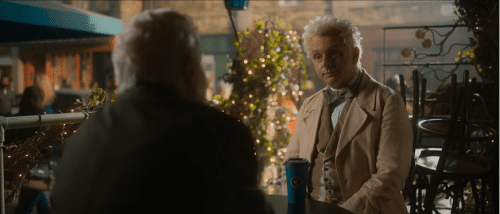
And he’s being told that the very thing that got him in trouble in the past – thinking for himself – is the very thing that makes him qualified for the highest position. “You’re just the angel for the job,” the Metatron tells him.
Yet Aziraphale initially resists.
“I don’t want to go back to Heaven. Where would I get my coffee?”
That is, where would I find the pleasures of food and drink that I’ve enjoyed in this human form? Where would I find the company of humans who make this wonderful coffee and sushi and compose this music and write these books and, and . . .
So, the Metatron sweetens the deal. He tells Aziraphale that he would have the jurisdiction to restore Crowley as an angel so that they can be together in Heaven.
An offer he can’t refuse
But there are hints that the Metatron’s offer is not to be trusted. One ominous clue is in his seemingly benign question to Nina about the name of her coffee shop: Give Me Coffee or Give Me Death. “Does anyone ever ask for death? I don’t suppose they do,” he muses. “So predictable.”
Then when he first meets Aziraphale at the bookshop, he offers him the cup of coffee. This is an obvious power move by the Metatron but it’s also a moment of foreshadowing. When he takes Aziraphale away from the bookshop – and away from Crowley’s watchful eye – he makes him an offer he can’t refuse. And he does it in a cleverly manipulative way.
First, he tells Aziraphale that he knows about his “de facto partnership with the demon Crowley.” In other words, I know that you’ve conspired with the enemy. Which, it goes without saying, is punishable by erasure from the Book of Life. Read: Death.
And here comes the real coffee: “If you wanted to work with him again, that might be considered irregular, but it would certainly be within your jurisdiction to restore your friend, Crowley, to full angelic status.”
That’s Aziraphale’s choice. Coffee or Death.
But it’s still a choice that is in complete alignment with Aziraphale’s qualities and commitments. He truly believes that what he has been offered is the best possible opportunity for him to do good, and to do it with Crowley at his side.
And this is why Aziraphale’s choice is so tragic.
“If I’m in charge . . . I can make a difference.”
That, I think, is Azi’s heartbreaking mistake — to fervently believe that he can change the system by being “in charge” of it.
No, Aziraphale. Unless Neil Gaiman has a clever plot twist up his sleeve for Season 3 (which is entirely possible), you are dreadfully mistaken.
I have seen too many good pastors become bishops whose virtues and ethics are compromised because of the system they serve.
You sincerely believe you can make things right. But once you come into power, you will not be able to withstand the pressure to serve, protect, and do the bidding of the institution. Either you will conform, or you will be expelled. Or even destroyed.
Crowley knows
Crowley knows this because he saw what happened to Gabriel, how they stripped him of everything and planned to wipe his memory. And he knows that Gabriel tried to incinerate Aziraphale in the holy flames of Hell after foiling the first Armageddon.
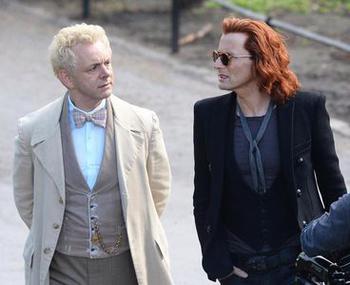
These are key pieces of information that Aziraphale doesn’t know. But instead of telling him, Crowley forges ahead with his original plan. With fits and starts Crowley drags out of himself the words he’s trying to convey about his feelings toward Aziraphale. He manages to tell the angel that he wants the two of them “go off together.”
No Heaven, no Hell. “They’re toxic.”
Like Gabriel and Beelzebub, he wants the two of them to get away, to be “just an us.”
Aziraphale’s face furrows in confusion. This is as much directness as Crowley’s ever mustered, with none of his characteristic sarcasm or swagger. He’s being vulnerable with Aziraphale for the first time. And Aziraphale can neither process it nor pivot.
“Come with me . . . to Heaven. I’ll run it, you can be my second-in-command.”
Whoa, wait, stop right there!
The fact that Aziraphale cannot see the enormous disparity in the power differential that would exist between them in this scenario is troubling, to say the least.
What has made their friendship and their bond so strong is that they are completely equal with each other. The two of them have worked both against and with each other over the millennia, resulting in a beautiful cosmic balance.
But Aziraphale’s choice to ask Crowley to join him in heaven and serve as second-in-command would irrevocably disrupt that balance.
Despite Aziraphale’s insistence that he needs Crowley, there would be no true partnership in this arrangement. Aziraphale would be Crowley’s boss, his commander-in-chief. Crowley would have to answer to Aziraphale, and thus to Heaven — the same system that cast him out. The same system that tried to destroy them both.
Crowley understands
This is what Crowley alludes to in his response to Aziraphale’s accusation that he doesn’t understand what he’s offering. (Which, by the way, is an indication that the power imbalance is already in play.)
“I think I understand a whole lot better than you do,” Crowley says.
This leaves Aziraphale with nothing more to say. No more words, no nightingales singing. Only Crowley’s final, Hail Mary attempt to win him over with an ardent kiss.
Shocked and breathless when Crowley finally releases him, Aziraphale pulls back his “I lo(ve you)” and pushes out instead: “I forgive you.”
It’s the last temptation of Aziraphale.
The temptation to give into his true feelings, the physical desire that he has barely concealed for 6,000 years.
“Forgive him, Father, for he knows not what he does.”
Jesus was betrayed by Judas’s kiss, but his mission to save humanity went forward. Similarly, Aziraphale will not allow a kiss to derail his mission to right the wrongs of Heaven.
And so, their paths of the demon and the angel diverge, even as their eyes linger in a last gaze of love and pain.
Speaking of Jesus . . .
Just before stepping into the heavenly elevator, Aziraphale inquires about the “great plan” that the Metatron wants him to direct.
“We call it the Second Coming,” the Metatron says with cold foreboding.
Thus, it appears that Crowley’s prophecy will come to pass. In S1E6 after thwarting the first attempt to end the world, the demon predicted that it wouldn’t be the last.
“For my money, the really big one is all of us against all of them.” In other words, Heaven and Hell against humanity. And that seems to be where Gaiman is taking the arc of this saga.
Where will Jesus fit in all of this?
That’s a question about which the fandom will doubtlessly speculate until Season 3.
In the meantime, Neil Gaiman will need to perform his characteristic wizardry to resolve this untenable situation between Aziraphale and Crowley. The end of Season 2 has left an Aziracrow-shaped hole in the universe that rips right down through the heart and guts of the Good Omens fandom. I’ve seen speculation, fan fiction, and fan art that has imagined all sorts of ways to fill this hole while we await the third season, which could be years away.
For my money, I’m counting on Aziraphale’s cryptic smile in the elevator as he ascends to his new position.
Either that smile indicates that he is imagining his meeting with the Son of God and convincing him to change his plans about the Second Coming.
Or Aziraphale suddenly realizes that the Metatron tricked him, and his smile in the elevator reveals that he has something up his sleeve…
In any case, the coffee shop sign does tell us one thing: Life begins after coffee.
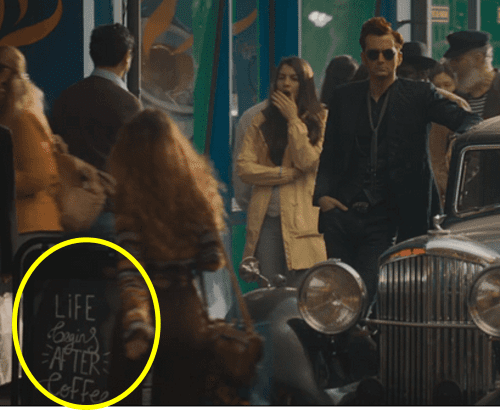
Read also:
Good Omens: An Antidote to Toxic Christian Apocalyptic Fiction
Falling In Love with Aziraphale and Crowley: Love Leaves Its Clues

The Rev. Dr. Leah D. Schade is the Associate Professor of Preaching and Worship at Lexington Theological Seminary in Kentucky and ordained in the ELCA. Dr. Schade does not speak for LTS or the ELCA; her opinions are her own. She is the author of Preaching in the Purple Zone: Ministry in the Red-Blue Divide (Rowman & Littlefield, 2019) and Creation-Crisis Preaching: Ecology, Theology, and the Pulpit (Chalice Press, 2015). She is the co-editor of Rooted and Rising: Voices of Courage in a Time of Climate Crisis (Rowman & Littlefield, 2019). Her newest book is Introduction to Preaching: Scripture, Theology, and Sermon Preparation, co-authored with Jerry L. Sumney and Emily Askew (Rowman & Littlefield, 2023).









